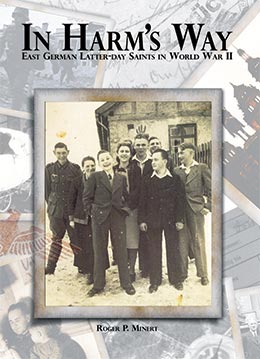Deutsch Rasselwitz Group, Hindenburg District
Roger P. Minert, In Harm’s Way: East German Latter-day Saints in World War II (Provo, UT: Religious Studies Center, Brigham Young University, 2009), 276-7.
Bertold Patermann joined The Church of Jesus Christ of Latter-day Saints in 1932, thanks to an enthusiastic man with whom Brother Patermann worked on the railroad. After his first wife died, Bertold married Kornelia Schiller, and she helped bring up his children in the new faith. The Patermanns formed the nucleus of the Church in the small town of Deutsch Rasselwitz in Silesia, just a few miles from the Czech border. The population of the town was about three thousand when World War II began.
“Later my father converted a neighbor lady and her daughter, who lived in the same house. That was our branch for a long time,” recalled Angela Patermann.[1]
During the late 1930s, American missionaries were common visitors in the Patermann home. The town was predominately Catholic, but the neighbors did not seem to care about the tiny group of religious outsiders. “They didn’t cause trouble because they thought we were nuts,” according to Angela Patermann. There was no persecution of any kind.
The Patermann home at Neustädterstrasse 150 hosted all Church meetings in Deutsch Rasselwitz until 1939. Brother Patermann, a priest in the Aaronic Priesthood, conducted a sacrament meeting on Sundays. For larger meetings, such as district conferences, the small group took the train to Ratibor (eighteen miles to the southeast) or Hindenburg (thirty-five miles due east).
Just before the war started, Bertold Patermann was transferred to Berlin in connection with his employment with the railroad, which was a government entity in Germany in those days. This meant the effectual end of the Latter-day Saint group in Deutsch Rasselwitz. The Patermann family became members of the Berlin East Branch.[2]
The Polish government expelled all Germans from Deutsch Rasselwitz by the end of 1946, so it can be surmised that no Latter-day Saints were living there after that time. The name of the town was soon changed to Racławice Sldskie.
No members of the Deutsch Rasselwitz group are known to have lost their lives in World War II.
Notes
[1] Angela Patermann Buchta, interview by the author, Salt Lake City, August 9, 2007.
[2] For more about the activities of the Patermann family, see the Berlin East Branch chapter.
